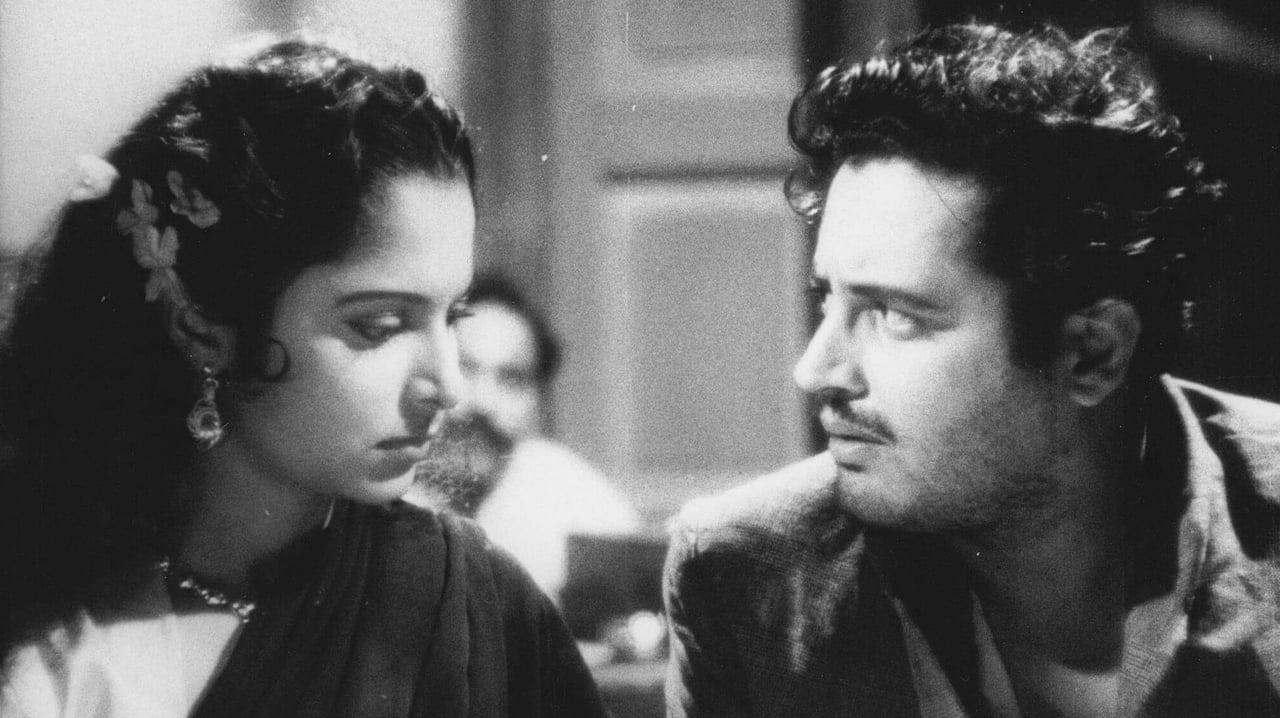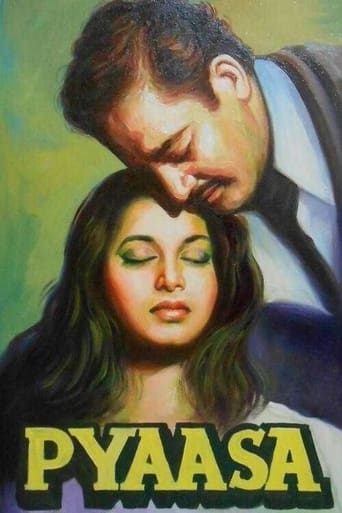

Best movie of this year hands down!
... View MoreExcellent and certainly provocative... If nothing else, the film is a real conversation starter.
... View MoreIt really made me laugh, but for some moments I was tearing up because I could relate so much.
... View MoreThe storyline feels a little thin and moth-eaten in parts but this sequel is plenty of fun.
... View MoreOne one the greatest movie ever made in bollywood.Great story,superb acting,Beautiful songs..Way ahead of its time.
... View MoreThis film is about a poet named Vijay(played by Guru Dutt).He is an innocent person and thus,is unsuccessful.The film tells about his sadness and other problems.The film tells about his love with Meena(played by Mala Sinha)who leaves him to marry a rich publisher(played by Rehman).Then there is a prostitute Gulabo(played by great actress Waheeda Rehman) who sings a song written by Vijay(Jaane kya tune kahi sung by Geeta Dutt).She then comes to know about it and starts liking Vijay.Some time later in the film,Vijay dies in a train accident and his poems are given for publishing by Gulabo to Meena and he becomes famous in some time.Now its found that it was someone else who died in the accident and Vijay is in a mental asylum for claiming that he is Vijay.The actual depressing things start then.What I liked in the movie? Music by SD Burman with Lyrics by Sahir Ludhianvi was the first thing I liked in the movie.Every song in the movie is great. Guru Dutt, Mala Sinha and Waheeda Rehman are great in lead roles,not to forget Rehmaan and Johnny Walker in the side roles which were equally important What I didn't like? Practically,there is nothing to dislike in this movie except the pessimistic tone of the movie.It was too pessimistic except for the two songs--Hum Aapki Ankhon me and Sar jo tera Chakraye.
... View MorePyaasa is a 1957 Drama movie directed and produced by arguably the greatest Indian filmmaker of all time, Guru Dutt. Dutt, who pioneered the integration of songs in the movie's narrative as well as the use of close-up shorts in Indian Cinema, is ubiquitously regarded as one of the most influential film-makers of his time. Dutt's avant garde works and his unique style of film-making have been a subject of discussion in various acting and film institutes all across the globe for well over five decades. In Pyaasa, Guru Dutt presents the poignant tale of a struggling poet ostracized by a hypocritical society that faces no qualms in immortalizing the dead, but finds it outlandish to exalt the living. Vijay, educated yet unemployed, epitomizes the hapless state of the Indian youth in the post-colonial India. A consummate artist, Guru Dutt was equally brilliant behind the camera as he was in front of it: his attention to detail as a director matched his ability to emote as an actor. Guru Dutt and his team were keen on casting the king of tragedy, Dilip Kumar in the lead role for Pyaasa, but Dutt himself had to fill in the shoes when an agreement couldn't be reached.Pyaasa, widely regarded as Dutt's magnum opus, represented a departure from the traditional style of film-making in the Indian Cinema, blurring the demarcations that hitherto separated art cinema from commercial cinema. With Pyaasa, Guru Dutt demonstrated for the first time, to both his audience and fellow film-makers, how a balance could be struck between creative aspirations and commercial requirements - a success formula that was completely unknown at that time. Pyaasa, along with Guru Dutt's autobiographical Kaagaz Ke Phool, is currently included in the list of all time greatest motion pictures, both by Time magazine's "All-TIME" 100 best movies and by the Sight & Sound critics' and directors' poll.Pyaasa's intense and thought-provoking plot emphasizes on the fact that every human being, howsoever wretched or deplorable, is capable of love and worthy of being loved. The movie also underlines the root cause of human plight: poverty, not of material but of thought. Guru Dutt, touted in film circles as India's Orson Welles, demonstrates in Pyaasa the might of words - an embodiment of human thought - as great stimuli for change. The stark theme of Guru Dutt's Pyaasa is highly reminiscent of Dostoevsky's Notes from Underground. The vituperative and somber tone of Vijay's poetry seems to betray the same sense of angst and guilt as that of Dostoevsky's Narrator.Vijay's apparent anger for society's hypocritical rigidity is indicative of his inner sense of chagrin for having failed in his efforts to be loud enough to be heard and for quietly accepting his fate. Pyaasa also highlights the complexities associated with the human psyche that give rise to unpredictability of behavior: Vijay, rejected by his lover (Mala Sinha) and family, is embraced by a prostitute, Gulabo (Waheeda Rehman) who is moved by the power of his poetry. While the world finds her despicable and treats her with contempt, she seems to be the only soul capable of reciprocating love and respect. It's both touching and mesmerizing to witness two pariahs of the society finding refuge in each other's abject solitude.As far as the source of Pyaasa's plot is concerned, it's surmised that the movie's story is loosely based on renowned lyricist Sahir Ludhianvi's failed affair with poetess and writer Amrita Pritam. Sahir Ludhianvi's evocative poetry adds real charm to S. D. Burman's soothing music, and indeed it's this synergy that livens up the movie's tempo in spite of its somber theme. The relentless questions that the movie poses to the viewer have the power to make a Polymath look askance at the pool of his knowledge and a Saint jitter in morbid terror. V. K. Murthy's detailed cinematography inexplicably reminds one of Gregg Toland's groundbreaking, brilliant camera-maneuvering techniques in Welles' magnum opus Citizen Kane. The movie's relatively inexperienced cast, hand-picked by Guru Dutt himself, makes most of the opportunity at disposal with almost everyone delivering a memorable performance with special mention of Johnny Walker, Mala Sinha, Waheeda Rehman and Mehmood. The Hindi word 'Pyaasa' translates to 'Thirsty' in English; the movie's plot is highly symbolic of the thirst that troubles the protagonist in form of his yearnings, which gradually take the form of angst and malaise owing to society's indifference and his continuous failure.Overall, Pyaasa is a formidable work of cinema that presents cinema at its finest by maintaining a delicate balance between art and entertainment, thereby serving to be a unique specimen of filmmaking. The movie also marked the beginning of somewhat scandalous association between Guru Dutt and Waheeda Rehman (a lot has been conjectured about Dutt's extra-marital relationship with Rehman... it's still a mystery whether the lovelorn Guru Dutt died of an accidental drug overdose or did he commit suicide). Pyaasa fulfills in its absolute sense the true purpose of cinema: to entertain and enlighten simultaneously. The movie is a must watch for all those who understand and appreciate thought-provoking cinema, and is a great means to get acquainted with Guru Dutt's oeuvre and also with the Classic Indian Cinema.(This review was first published at A Potpourri of Vestiges)
... View MoreIts so amazing how these days movies are made which are such a far cry from reality that people actually start forgetting what reality actually is. But the fact remains that real is what reality is. This movie shows this by portraying it most amazingly and truthfully. There is not one soul on earth who would not have burned when Rafi sings with the face of Guru Dutt - 'Jala do jala do jala do yeh duniya'. This movie is not a portrayal of India in the 50s but its the portrayal of life, the world and the people in it picked up from any time-line of its existence. I feel honored to have watched a movie like this and disgraced to have lived in a world like this.
... View More